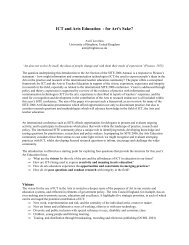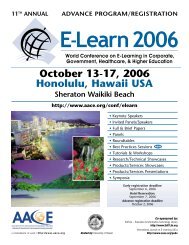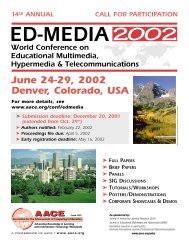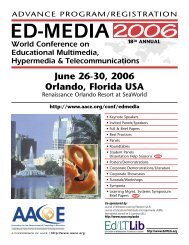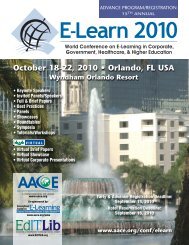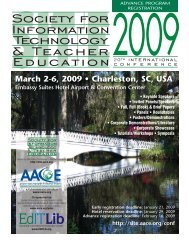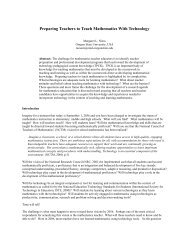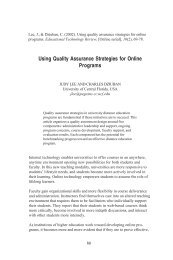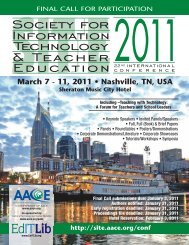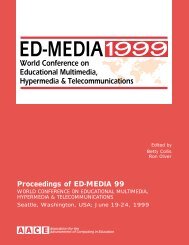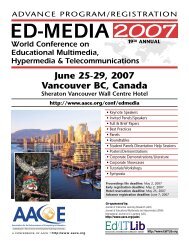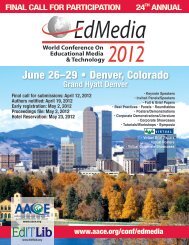ED-MEDIA 1999 Proceedings Book - Association for the ...
ED-MEDIA 1999 Proceedings Book - Association for the ...
ED-MEDIA 1999 Proceedings Book - Association for the ...
Create successful ePaper yourself
Turn your PDF publications into a flip-book with our unique Google optimized e-Paper software.
How do we deal with conveying expert's knowledge via ADF<br />
A particular problem we face is that most of our IT faculty have lived through <strong>the</strong> days of CBI and have a<br />
wealth of experience and scars to show <strong>for</strong> it. Can we convey that experience in ADF Conveying<br />
experience is important but not <strong>the</strong> only factor. Focussing on early approaches to Computer Based<br />
Instruction, <strong>for</strong> example, can detract from <strong>the</strong> differences and emphasis in <strong>the</strong> new work on computer based<br />
learning environments, constructivism, situated learning, and so <strong>for</strong>th. Fur<strong>the</strong>rmore, what design should be<br />
chosen There is <strong>the</strong> issue of student choice over knowledge of essential content, as judged by <strong>the</strong><br />
connisseur professor. How are <strong>the</strong> disagreements within <strong>the</strong> group about what essential content should be<br />
handled<br />
How do students obtain access to <strong>the</strong> resources needed to complete <strong>the</strong> courses<br />
A course which requires only reading material has a slight advantage over IT courses, which require that<br />
students have access to some of <strong>the</strong> latest, most powerful and expensive hardware and software, such as<br />
Authorware, NT Servers, and so <strong>for</strong>th. How is this equipment to be provided in ADF This raises issues<br />
related to <strong>the</strong> choice of technologies, such as WWW, synchronous audio or videoconferencing, mailed CD-<br />
ROMS, videotape, and fax.<br />
What data should be tracked and how will it be tracked<br />
Per<strong>for</strong>mance and communication data can be delivered easily on <strong>the</strong> WWW but systems to track and make<br />
use of that data are still somewhat primitive and difficult or time-consuming to construct in terms of<br />
programming, database access, and so <strong>for</strong>th. What should be tracked is an interesting question particularly<br />
if assignments are made where assessment by judgements made on analysis and writing are deemed<br />
important.<br />
What issues arise from building a non-conventional degree in a conventional, research-oriented<br />
university<br />
Promotion, tenure, and <strong>the</strong> occasional deafening lack of interest are but many of <strong>the</strong> issues to be faced in<br />
this category. As members of <strong>the</strong> Education Faculty, we are privileged that our research and course<br />
development activities can coincide. What has been <strong>the</strong> experience of some of our colleagues and what<br />
changes seem to be in <strong>the</strong> future<br />
What is <strong>the</strong> reaction of students, who are by and large majoring in instructional technology<br />
Student involvement in building ADF-courses and <strong>the</strong>ir reaction are always important issues. They are<br />
particularly crucial when <strong>the</strong> students are studying IT as opposed to studying o<strong>the</strong>r content domains using<br />
IT.<br />
How does one build an infrastructure to promote ADF courses and degrees<br />
ADF courses imply a certain infrastructure to develop and maintain. These include not only hardware,<br />
software and telecommunications, but support, encouragement, and active participation by administration.<br />
There is also <strong>the</strong> issue of providing an example to o<strong>the</strong>r departments and faculties, such as Adult and<br />
Higher Education, Library, and <strong>the</strong> creation of a generic M.Ed. program.<br />
What is <strong>the</strong> role of face to face (F2F) instruction in ADF<br />
Is F2F instruction required in all situations Where can it be optimized and where can it be dispensed<br />
with Is <strong>the</strong>re a body of evidence that argues <strong>for</strong> or against effectiveness, efficiency and optimality of<br />
learning with or without F2F Does it take more work to teach a course with significant group and<br />
Computer Mediated Communication components A related issue is <strong>the</strong> conflict with <strong>the</strong> potential of ADF<br />
and <strong>the</strong> mental models held by many current university instructors. Communication difficulties tend to be<br />
amplified and take longer to resolve, particularly where asynchronous communication is involved. This<br />
may be a trade off <strong>for</strong> <strong>the</strong> inability of an instructor to address individual questions in a large class of more<br />
than 25 students.<br />
What is <strong>the</strong> return on investment on course development <strong>for</strong> ADF<br />
Most educational institutions view ADF as a cost, and an add-on cost at that, without considering ei<strong>the</strong>r <strong>the</strong><br />
return on <strong>the</strong> investment or <strong>the</strong> cost of not implementing ADF. There are often to erroneous cost<br />
3



